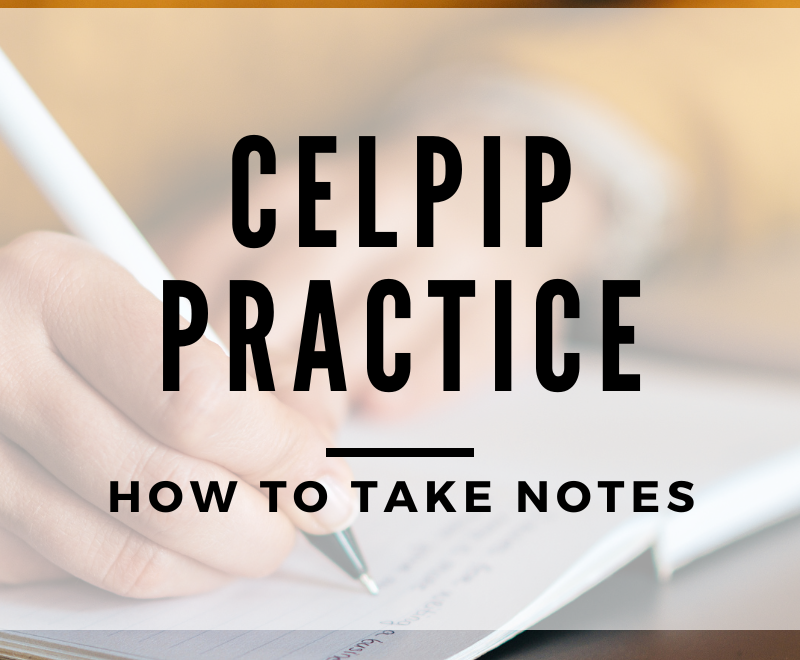You need to learn how to take notes effectively to make it through the CELPIP Listening Section successfully. This post will give you 10 pointers to help you.

But first, let’s tackle the question that many test takers ask: Do I really need to take notes to do well on the test?
The answer: Yes! Here’s why…
Why You Need To Take Notes
You need to take notes because you’ll likely be nervous on your test day. When you’re nervous, you very likely will find it harder to focus or concentrate on what you’re hearing. Note taking can help you with that!
You are a human being! This means, that unless you have been gifted with an amazing memory that allows you to retain the details of what you hear while listening to an audio clip for up to 4 minutes, then you’re going to want to take notes.
You also need to be prepared for the kind of audio you will experience on the exam. You’ll be hearing authentic audio, not something specially prepared for English learners.
If you’re not taking notes, you have a good chance of getting lost and missing important details.
A Common Reason People Give To Not Take Notes
“When I try to write what I think is important, I find that I get lost in the audio anyway. I feel like I miss important sections because I’m too focused on writing.”
You’re right. At first it is hard to listen and take notes at the same time. I get that. But guess what? This is a skill you can practice and become better at. I promise.
If you make it your mission to spend time listening and taking notes, even if it’s only a few minutes each day, YOU WILL see progress, and you will notice that it becomes easier for you. I promise!
Here are 10 tips to help you get started…
10 Tips For Better Notes:
- Take notes using paper and pen. (You’ll only be given paper and pen/pencil on the day of your test, so get used to using it!)
- Take notes in chronological order or in the sequence in which you hear the ideas mentioned.
- Write with bullet points.
- Don’t write complete sentences! Only write enough to trigger your memory later.
- Write your list from top to bottom – in other words, make sure your ideas are organized vertically and not spread all over your paper. This will help you brain chunk or organize the information for recall later.
- Divide your note paper into columns depending on the number of speakers. (The test intro will tell you how many speakers there will be.)
- Use abbreviations to help you write faster- official abbreviations, Cdn for example, for Canadian. You can also create your own as long as you remember what they mean.
- Use quick drawings that represent key words.
- Practice watching newscasts and listening to audio interviews. See if you can answer Who, What, When, Where and Why about what you are listening to or watching.
- You can’t write every word you’ll be hearing. Nobody can write that fast, unfortunately. Instead, focus on picking out keywords from what you are hearing. Keywords could include, but are not limited to: names of places or institutions that are mentioned, time references, most important event or what happened in the audio – again, not every word. Perhaps a word or two that would help you remember what that event or action was.
This point is so important I’m repeating myself: Practice listening to an authentic audio source in English every day, and do your best to take notes on what you are listening to. You WILL get better at this the more you do it.



[…] Unfortunately, brainstorming is one of those frequently skipped strategies – right up next to notetaking. […]